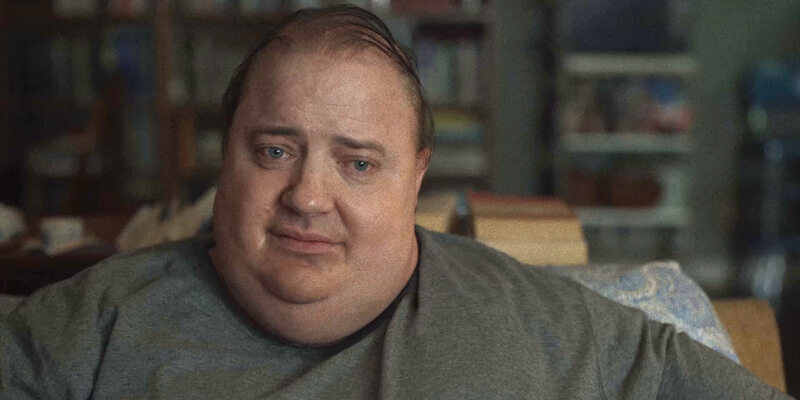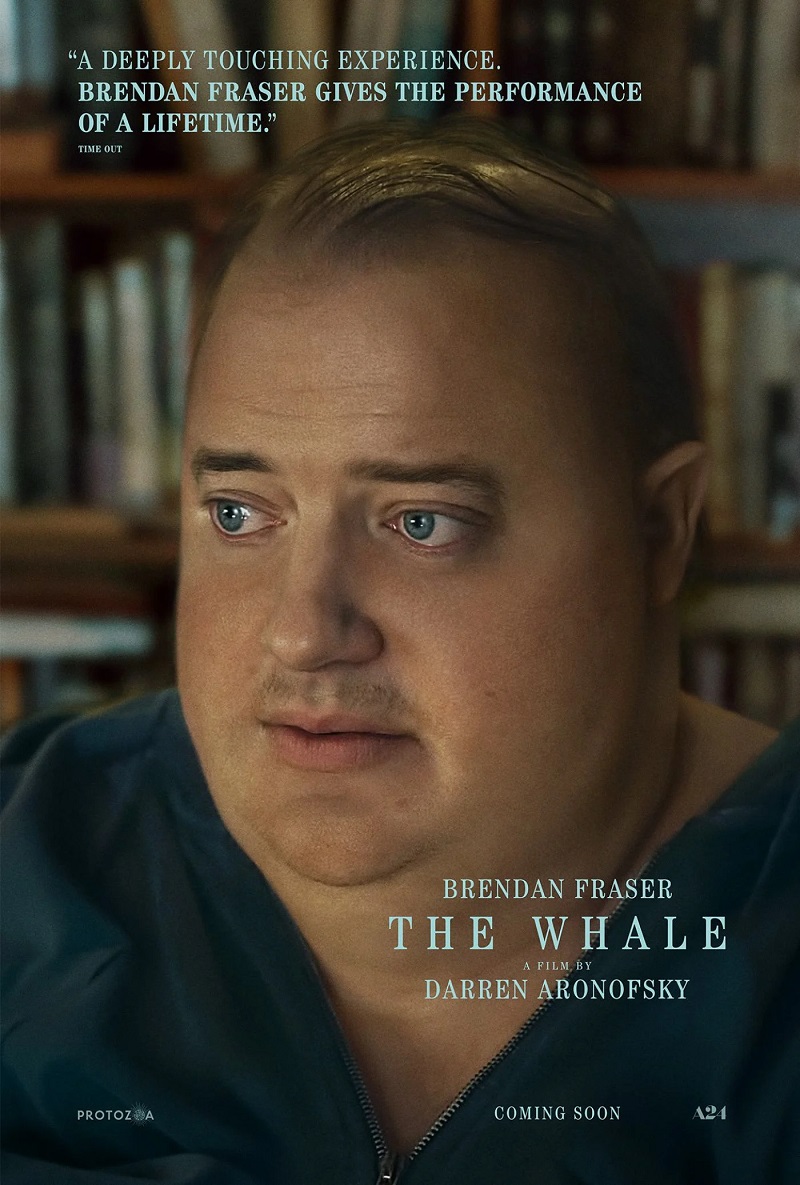
Review by Eric Hillis
Directed by: Darren Aronofsky
Starring: Brendan Fraser, Hong Chau, Sadie Sink, Samantha
Morton, Ty Simpkins

Most of us would have no qualms intervening if we felt someone we knew was
ruining their health with alcohol, drugs or cigarettes. In fact we're
encouraged by society to do so. Why is it then that we feel unable to do the
same for someone who is potentially killing themselves with their eating
habits? Of, course this only works one way. We're encouraged to speak up if
we see someone "wasting away," but if someone is piling on weight to the
point where it's affecting their health we're supposed to turn a blind eye
lest we be accused of "fat-shaming." Conversely, it's socially acceptable to
deride those who look after their bodies - you can use terms like "fitness
freak" and "health nut" and nobody will bat an eyelid. Both of my parents
lived shorter lives than they should have because they had terrible diets
and non-existent exercise regimes that ultimately clogged their arteries to
the point that meant they were unable to survive a heart attack and a bout
of COVID-19. I never mentioned their weight to them when they were alive,
because I was afraid of fat-shaming them, and also because I wasn't exactly
svelte myself (seeing my dad's grisly post-mortem results made me realise I
needed to change my lifestyle, though it took a long time for me to actually
do something about my weight). I'm not sure how we're supposed to have this
conversation, and it seems like a dialogue it's harder to have now than it
ever has been in the past. I'm not sure who is even allowed have this
conversation. If a fit person remarks on an overweight person's health it
will come off as "punching down," but for an overweight person to make the
same comments would seem hypocritical.
I don't know how to have this conversation, and based on
The Whale, neither do director Darren Aronofsky and writer
Samuel D. Hunter, the latter of whom is adapting his 2013 stage play.
I'm sure neither Aronofsky nor Hunter are cruel fat-phobes, and that they
come from a well-meaning place with this tale, but
The Whale never doesn't play like a case of punching down.
It's one of those patronising movies that makes you realise why
middle-Americans are so averse to what they call "coastal elites."

The Whale is set in the heart of what coastal American snobs
call "flyover country," in the MidWest state of Idaho, where Google tells me
31% of the population are obese. Our protagonist, English teacher Charlie
(Brendan Fraser), isn't merely carrying a few extra pounds - he's
morbidly obese, barely able to move his 600lb frame from his couch without
assistance. That assistance comes from home-help nurse Liz (Hong Chau), who has a personal connection to Charlie that allows him to feel
comfortable in her presence. While lecturing him to go to the hospital
before it's too late, Liz enables Charlie by bringing him multiple hot subs
and buckets of chicken every time she visits.
Charlie leaves the door unlocked for Liz, leading to an awkward moment when
Charlie's masturbation session (which almost leads to a heart attack) is
interrupted by the visit of Thomas (Ty Simpkins), a young Christian
missionary who decides he might be able to save Charlie's soul. Initially
it's unclear if Thomas feels this way because he disapproves of Charlie's
homosexuality or because it's clear Charlie doesn't have long left in this
world. Is Thomas on a selfish mission or one of genuine empathy? This is the
one ambiguous thread in a movie that otherwise hammers home every point as
though Aronofsky was irked by the general "I don't get it!" reaction to his
previous movie,
Mother!.
Not so nuanced is a subplot that sees Aronofsky rehash
The Wrestler, with Charlie attempting to reconnect with his estranged 17-year-old
daughter Ellie (Sadie Sink). Ellie refuses to forgive her father for
walking out on her and her mother (Samantha Morton) when he fell in
love with one of his students. Ellie is a one-note monster, described as
"evil" by her mother. We're inclined to agree considering the cruelty she
inflicts on both Charlie and Thomas, though we suspect she's simply hiding
behind her true feelings.

Set entirely in Charlie's apartment, The Whale has the
structure of a classic sitcom with various characters popping in and out to
make blunt points and occasionally deliver some backstory. We almost expect
an audience applause the fifth time Thomas awkwardly barges in. I'm
sympathetic with filmmakers who had to lower their ambitions due to pandemic
restrictions, but there's no excuse for a movie as uncinematic in its
storytelling as The Whale, which doesn't have a single memorable shot and is lit as though Charlie
lives in the apartment of a serial killer in some '90s David Fincher
knockoff. The entire story is told through dialogue, and this raises
specific problems. The trouble with using words rather than images, of
telling rather than showing, is that the audience is forced to take the
characters at their word. We have no option but to believe what we're told
here, so when Ellie tells us that her father's apartment stinks we have to
take the word of an unreliable source, as Aronofsky never uses visuals to
convey whether she might be correct or not. This is something that could be
communicated as simply as having a character open windows when they enter
Charlie's apartment, like how Grace Kelly turns on all the lights when she
enters Jimmy Stewart's gaff in
Rear Window, showing us that she's unaccustomed to the darkness he's become
comfortable living in.
But the lack of visual invention is the least of The Whale's problems. Its title is a reference to Moby Dick (what else?), with
Charlie so enamoured with a crudely written essay on Melville's book that
reciting its words can fend off his heart attacks (as alternative medicines
go, that really takes the biscuit). But if you want to have a conversation
about obesity, maybe a less mocking title could have been found. The movie
doesn't mean to deride Charlie, but at times he's shot in a manner that
recalls genuinely fat-phobic comedies like
Big Momma's House and the "Fat Bastard" character from
Austin Powers. Things aren't helped by cramming Fraser's frame into a fat suit. As fat
suits go it's one of the better ones I've seen, but it's always recognisable
as a fat suit and when Fraser is forced to shuffle around he looks like some
Japanese stuntman in a rubber Godzilla outfit.
Some have suggested Charlie should have been played by an actor who
physically matched the part, but that seems like something no insurance
company would touch with a barge pole. Casting an actual 600lb actor would expose how exploitative Aronofsky's
film really is, regardless of his intentions. Watching someone whose weight
means they could die at any moment play a character who knows he's in his
final days would be borderline snuff material.
Through the character of Ellie, there's a theme that sometimes you have to
be cruel to be kind (I admit I do like the idea that a surly teenage girl
makes for a great life coach because she'll have no qualms about pointing
out your every flaw), but it's an unconvincing one, as nobody is really able
to help Charlie except himself. In the end, The Whale seems to
victim-blame its unhealthy protagonist for the hurt his lifestyle has caused
others. If pizza left as bad a taste in the mouth as Aronofsky's film,
obesity might not be such a widespread problem.

Given the leaden script he's lumbered with, Fraser does a remarkable job
here. You can't help but warm to him, and his empathetic performance always
seems to be fighting against the film's otherwise guinea-pig-in-a-cage use
of Charlie as a test subject. When the camera gets in tight to Fraser's face
we can momentarily forget about the fat suit and focus on the actor as he
sells the pain of a man whose body is too wide to receive a hug. In her
limited time, Morton is equally impressive, and her one-word reaction to
Charlie's weight is one of the few moments of the movie that feels
genuine.
One of the cardinal rules of film criticism is that you shouldn't criticise
a film for not being the movie you'd like it to be. I can't do that with
The Whale, because I simply don't know what the good version of this movie looks
like. There's an important conversation that might have been started by
The Whale, but Aronofsky's condescending approach will likely shut down any
potential dialogue, which is a shame.


